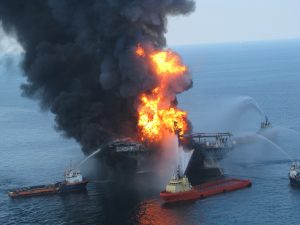GoMRI Research Board in Memory of the Deepwater Horizon Blowout
– April 20, 2015
On behalf of the GoMRI science community, the Research Board extends our thoughts and prayers to those who lost their lives on April 20, 2010 and their families and to those whose health and livelihoods were impacted.
Five years ago, the world was transfixed by the explosion and fire at the Deepwater Horizon oil rig. For eighty-seven days as oil and gas poured into the Gulf, this tragedy reminded us of the risks associated with our dependence upon fossil fuel.
Each year, we commemorate this incident by sharing GoMRI scientific and technological advances that help society be better prepared in the event of future spills.
Here are links to GoMRI articles marking the 2010 oil spill:
- Research on Oil Transport that Informs Spill Response (first in a three-part series to be followed by Research on Dispersants that Informs Oil Spill Response and Research on Oil Biodegradation and Monitoring that Informs Spill Response)
- GoMRI Advances Science on Oil Spill Four Years after the Deepwater Horizon Oil Spill
- The Human Side of Oil Spill Response
************
The GoMRI is a 10-year independent research program established to study the effect, and the potential associated impact, of hydrocarbon releases on the environment and public health, as well as to develop improved spill mitigation, oil detection, characterization and remediation technologies. An independent and academic 20-member Research Board makes the funding and research direction decisions to ensure the intellectual quality, effectiveness and academic independence of the GoMRI research. All research data, findings and publications will be made publicly available. The program was established through a $500 million financial commitment from BP. For more information, visit https://gulfresearchinitiative.org/.
© Copyright 2010- 2017 Gulf of Mexico Research Initiative (GoMRI) – All Rights Reserved. Redistribution is encouraged with acknowledgement to the Gulf of Mexico Research Initiative (GoMRI). Please credit images and/or videos as done in each article. Questions? Contact web-content editor Nilde “Maggie” Dannreuther, Northern Gulf Institute, Mississippi State University (maggied@ngi.msstate.edu).






